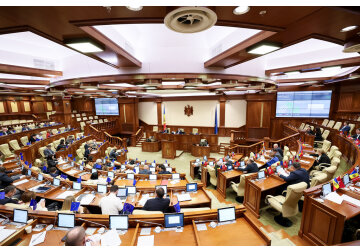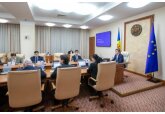
Moldovan Parliament approves the 4th package on debureaucratization and facilitation of business activity.
In particular, the MPs passed in the second reading draft amendments to some normative acts aimed at facilitating business activity. This is the 4th approved package, which aims at eliminating administrative barriers, unreasonable or outdated requirements, contributing to reducing the costs of economic agents in their business activities and limiting corrupt practices. In particular, at the initiative of the Ministry of Economic Development and Digitalization there will be amended 12 regulations, laws that cover various areas: public procurement and commodity exchanges, construction and urbanization, consumer protection, rural tourism, instruction in the field of hygiene, health and safety at work, certification of public keys, etc. According to the authors' estimates, the draft law will save about 183 million lei annually. The authors proposed to recognize commodity exchanges authorized in EU countries, if they are officially registered as legal entities in Moldova and meet the minimum requirements of the local legislation. In addition, the concept of "commodity exchange" in general will be modernized to ensure its compliance with modern commodity exchange models. Important new elements include: allowing trading in the form of procurement procedures on an electronic platform managed by the commodity exchange; enabling the exchange to manage several categories of markets; a greater variety of exchange contracts, etc. This modernization trend will enable electronic transactions and diversification of exchange contracts. Another innovation is the abolition of the "book of complaints" in physical form: it is proposed to abolish the obligation to keep it in a conspicuous place and maintain it. Instead, the law will state that the company is obliged to receive and register consumer complaints. Today, all trade and catering companies are required to have a complaints book, but they are minimally used. In the EU, the complaints book has long been replaced by new mechanisms (calls to the hotline, solving issues directly with merchants, etc.). The abolition of this requirement in Moldova will allow businesses to save about 2 million lei annually for the purchase of complaint books. According to the Ministry of Economic Development and Digitalization, any complaint submitted directly to sellers or to the State Inspectorate for Non-Food Products Surveillance and Consumer Protection has the same legal force as an entry in the complaints book. At the same time, in connection with disputes arising between consumers and purchasers over non-compliance of non-food products, the Law on Consumer Protection will provide for a longer period of repair or replacement of goods, but only with the consent of the consumer: instead of 14 days, up to 30 days will be allowed. It is also envisaged to abolish the norm that allows the consumer to demand a refund if any defect appears within 6 months of using the goods. This measure is considered unfair to the seller and is an abuse on the part of the consumer. It is also envisaged to expand the categories of entities that will be able to conduct technical expertise to determine the cause of non-compliance of the goods. Other changes concern the removal of restrictions on rural houses on the number of rooms and tourists, as well as the range of products used to serve tourists. Rural houses will be able to provide food for tourists using products of their own production, grown in the farms of the settlement or nearby settlements. At the same time, hygiene training will be organized free of charge and online, which will save 10 million lei annually. The obligation for periodic training of unit managers and workers sent for labor protection training, which is conducted once every 3 years, will also be abolished and replaced by lifelong training. In this case, 77 million lei will be saved. The legislative amendments also envisage the abolition of the validity term of travel tickets, the exclusion of statements in relations with the owners of public utilities (natural gas, water and sewerage, electricity, heat energy). In particular, it will not be necessary to present extracts of data that are available in public registers. Such an extract costs 130 lei, which means that the annual savings for business will amount to about 4.7 million lei. There will also be a possibility of remote interaction between the operator and the consumer: this will allow saving another 1.5 million lei, if at least 30% of interactions will take place remotely. It will also be easier to obtain an electronic signature - thanks to remote identification with verification through video recording of the applicant; it will be possible to obtain an electronic signature remotely. The estimated savings will amount to 14 million lei. The draft law was elaborated taking into account the European legislation in this field. // 29.02.2024 – InfoMarket







